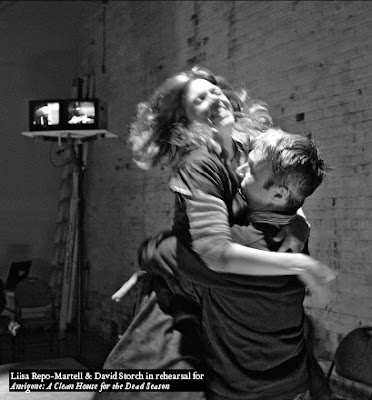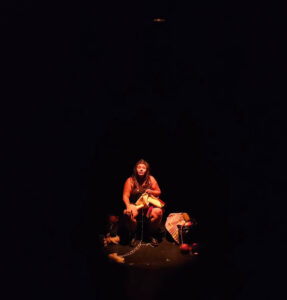I remember the first time I read Sophocles’ Antigone; it was at the beginning of my first year of my Undergraduate Degree at Dalhousie University. At seventeen, I was still searching for those clear-cut answers, and I read Antigone as a play about the oppressive ruler who acts only for what he sees as the communal good, and the tragic heroine who dares to disobey him out of honour and respect for her family. My interpretation was thus: Antigone is driven by her religious beliefs to bury her dead brother. King Creon, her uncle, has forbidden that he be buried because the state must see him as a traitor to the crown and its power. Antigone defies her uncle in a heroic sacrifice and dies at his oppressive hand. In Jean Anouilh’s 1944 adaptation of this play, which plays at Soulpepper Theatre until October 17th, 2009, these issues of villainy versus heroism become increasingly murky and densely complex.
Anouilh wrote his adaptation in France during its occupation by the Nazis. It is clear that the issues raised in this play would have been dramatically relevant for this play’s first audience. Most of France’s population had acceded to Nazi rule, mostly out of fear and hopelessness, the small Resistance, as Paula Wing writes in her programme notes, were, “like Antigone herself, a small militant minority.” Anouilh’s adaptation of Sophocles’ original skillfully retells the tale of Antigone, without changing too much of the story, yet places it in a more modern time and fleshes out the characters and their familial relationships in way that I found easy to connect to. Both Antigone and Creon seemed less like the grandiose figures of myth and more like human beings, which could be seen as deflating the sense of hamartia, or tragic flaw, in the characters. However, I found that my connecting to these characters only strengthened the interest that I had for them.
Chris Abraham directed Soulpepper’s production, and he kept the stage very dark and the actors in shadows, which produced an extremely eerie effect. Indeed, the deeds depicted in this play are all ones performed in concealment. The actors moved around the stage, surrounding the audience on three sides, which added to an eerie sense of entrapment. We were complicit to the secret of these deeds, and therefore, like Antigone, we must be carefully monitored and restricted. The feeling of being watched was also a strong presence throughout the show. There was a strange moment where David Storch, as Chorus, came onstage and stood far stage left smoking a cigarette, while Creon and Antigone had a heated argument far stage right. He did not say a word, and it is possible that some members of the audience may not have realized that he was there, but I found it to be the creepiest moment of the production. There were also small television monitors set up, which frequently were reduced to “snow,” and although they also seemed to create the illusion of a looming omnipresence, they also seemed a bit anachronistic and distracting to me.
The performances in this piece were particularly fascinating. Jordan Pettle played a beautiful Haemon, whose naïve faith and goodness was nicely offset by the world he inhabited. Jeff Lillico was wonderful as the shifty Guard, whose misogyny and arrogance disappears once he is faced with Creon, and glimmers of humanity shine through his self absorption and apathy as we see him always teetering one step from death. David Storch’s one-man chorus reminded me a bit of the Emcee from Kander and Ebb’s Cabaret. He seemed unnerved at being responsible for telling such a tale, perhaps because Creon had forbidden it to be spoken. Yet, he also seemed boiling with the same rage as Antigone, a frustration and sense of rebellion, which seemed almost stuck in his throat. I don’t always find that David Storch’s intentions are clear, but I always find them intensely interesting and entirely captivating.
Liisa Repo-Martell and R.H. Thompson are not the Antigone and Creon I imagined when I was seventeen. Repo-Martell’s Antigone had a wild stubbornness that sometimes defied sense, while Thompson’s Creon was earnest, sometimes nearly tender, in a desperate attempt to save his seemingly suicidal niece. What I found so interesting about Antigone and Creon within the context of Abraham’s production were the illusions that were created both in the script, by the actors, and in the soundscape (by Richard Feren), to the fear of growing up. Repo-Martell’s Antigone had all the idealism and the stubborn, passionate, unreasonable attitude of a child. She has a line where Creon asks if she understands the reasons why he must behave the way he does as King, and Antigone responds by saying, “I don’t want to understand.” She wants the world to remain perfect and fair, the way she had perceived it as a young child and she wants Haemon to remain innocent and unaffected by the world or else she will cease to love him. Repo-Martell’s Antigone dies not only in defiance to Creon’s refusal for her brother to be buried, but as an act of disapproval of the entire corrupt, absurd, cruel, unfair world. R.H. Thomson’s brilliant portrayal of Creon stands as a pillar of sense, of authority, as the grownup who must make the difficult decisions, and who must abide by the world’s laws and society’s norms in attempt to bring order and decorum to the people. He admits he may be wrong, yet he can see no other alternative. He is trapped in a way that Antigone is not. Who is right? Who are the villains and the heroes here?
There is a thundering ticking noise that underscores much of this production, of time ticking away, that reminded me of the crocodile from Peter Pan. Indeed, this production of Antigone was reminiscent of a tragic plea for Neverland. Creon’s page, played by Andrew Barbosa, is a ten-year-old boy, and Creon tells him at the end of the play, “Don’t grow up if you can help it.” To live in innocence can be bliss, to realize that being grown up means playing the pirate can be Hell, but the tragedy comes when the blinders of childhood are removed, and one is rendered hopeless in the knowledge that she will never return to a world of perfection, and will never survive among pirates unless she learns to compromise her lofty ideals.
If you’re looking for a night of fun, frolic at the theatre, I’m not sure this is the production I would recommend. But, if you’re looking for a production that will require intellectual analysis, and that raises questions that you had perhaps not encountered in Antigone before and that may send you home debating fiercely with your friends, this may be just the production for you to see.
Antigone runs until October 17th, 2009 at the Young Centre for the Performing Arts (55 Mill Street, Building 49 in the Distillery). Tickets are available by calling 416.866.8666 or visiting the Soulpepper website. $20.00 tickets are also available for those between the age of 21-30 at http://www.stageplay.ca/.
Anouilh wrote his adaptation in France during its occupation by the Nazis. It is clear that the issues raised in this play would have been dramatically relevant for this play’s first audience. Most of France’s population had acceded to Nazi rule, mostly out of fear and hopelessness, the small Resistance, as Paula Wing writes in her programme notes, were, “like Antigone herself, a small militant minority.” Anouilh’s adaptation of Sophocles’ original skillfully retells the tale of Antigone, without changing too much of the story, yet places it in a more modern time and fleshes out the characters and their familial relationships in way that I found easy to connect to. Both Antigone and Creon seemed less like the grandiose figures of myth and more like human beings, which could be seen as deflating the sense of hamartia, or tragic flaw, in the characters. However, I found that my connecting to these characters only strengthened the interest that I had for them.
Chris Abraham directed Soulpepper’s production, and he kept the stage very dark and the actors in shadows, which produced an extremely eerie effect. Indeed, the deeds depicted in this play are all ones performed in concealment. The actors moved around the stage, surrounding the audience on three sides, which added to an eerie sense of entrapment. We were complicit to the secret of these deeds, and therefore, like Antigone, we must be carefully monitored and restricted. The feeling of being watched was also a strong presence throughout the show. There was a strange moment where David Storch, as Chorus, came onstage and stood far stage left smoking a cigarette, while Creon and Antigone had a heated argument far stage right. He did not say a word, and it is possible that some members of the audience may not have realized that he was there, but I found it to be the creepiest moment of the production. There were also small television monitors set up, which frequently were reduced to “snow,” and although they also seemed to create the illusion of a looming omnipresence, they also seemed a bit anachronistic and distracting to me.
The performances in this piece were particularly fascinating. Jordan Pettle played a beautiful Haemon, whose naïve faith and goodness was nicely offset by the world he inhabited. Jeff Lillico was wonderful as the shifty Guard, whose misogyny and arrogance disappears once he is faced with Creon, and glimmers of humanity shine through his self absorption and apathy as we see him always teetering one step from death. David Storch’s one-man chorus reminded me a bit of the Emcee from Kander and Ebb’s Cabaret. He seemed unnerved at being responsible for telling such a tale, perhaps because Creon had forbidden it to be spoken. Yet, he also seemed boiling with the same rage as Antigone, a frustration and sense of rebellion, which seemed almost stuck in his throat. I don’t always find that David Storch’s intentions are clear, but I always find them intensely interesting and entirely captivating.
Liisa Repo-Martell and R.H. Thompson are not the Antigone and Creon I imagined when I was seventeen. Repo-Martell’s Antigone had a wild stubbornness that sometimes defied sense, while Thompson’s Creon was earnest, sometimes nearly tender, in a desperate attempt to save his seemingly suicidal niece. What I found so interesting about Antigone and Creon within the context of Abraham’s production were the illusions that were created both in the script, by the actors, and in the soundscape (by Richard Feren), to the fear of growing up. Repo-Martell’s Antigone had all the idealism and the stubborn, passionate, unreasonable attitude of a child. She has a line where Creon asks if she understands the reasons why he must behave the way he does as King, and Antigone responds by saying, “I don’t want to understand.” She wants the world to remain perfect and fair, the way she had perceived it as a young child and she wants Haemon to remain innocent and unaffected by the world or else she will cease to love him. Repo-Martell’s Antigone dies not only in defiance to Creon’s refusal for her brother to be buried, but as an act of disapproval of the entire corrupt, absurd, cruel, unfair world. R.H. Thomson’s brilliant portrayal of Creon stands as a pillar of sense, of authority, as the grownup who must make the difficult decisions, and who must abide by the world’s laws and society’s norms in attempt to bring order and decorum to the people. He admits he may be wrong, yet he can see no other alternative. He is trapped in a way that Antigone is not. Who is right? Who are the villains and the heroes here?
There is a thundering ticking noise that underscores much of this production, of time ticking away, that reminded me of the crocodile from Peter Pan. Indeed, this production of Antigone was reminiscent of a tragic plea for Neverland. Creon’s page, played by Andrew Barbosa, is a ten-year-old boy, and Creon tells him at the end of the play, “Don’t grow up if you can help it.” To live in innocence can be bliss, to realize that being grown up means playing the pirate can be Hell, but the tragedy comes when the blinders of childhood are removed, and one is rendered hopeless in the knowledge that she will never return to a world of perfection, and will never survive among pirates unless she learns to compromise her lofty ideals.
If you’re looking for a night of fun, frolic at the theatre, I’m not sure this is the production I would recommend. But, if you’re looking for a production that will require intellectual analysis, and that raises questions that you had perhaps not encountered in Antigone before and that may send you home debating fiercely with your friends, this may be just the production for you to see.
Antigone runs until October 17th, 2009 at the Young Centre for the Performing Arts (55 Mill Street, Building 49 in the Distillery). Tickets are available by calling 416.866.8666 or visiting the Soulpepper website. $20.00 tickets are also available for those between the age of 21-30 at http://www.stageplay.ca/.







